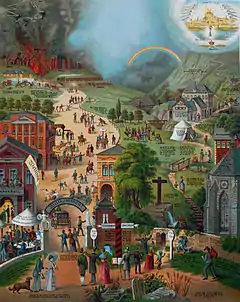Matthew 7:13
Matthew 7:13 is the thirteenth verse of the seventh chapter of the Gospel of Matthew in the New Testament and is part of the Sermon on the Mount. This verse begins the concluding summary of the Sermon, a series of warnings about not following the teachings laid out.
| Matthew 7:13 | |
|---|---|
← 7:12 7:14 → | |
 Der breite und der schmale Weg ("the broad and the narrow road"), from 1866. | |
| Book | Gospel of Matthew |
| Christian Bible part | New Testament |
Text
In the King James Version of the Bible the text reads:
- Enter ye in at the strait gate: for wide is the gate, and broad is the way,
- that leadeth to destruction, and many there be which go in thereat:
The World English Bible translates the passage as:
- Enter in by the narrow gate; for wide is the gate and broad is the
- way that leads to destruction, and many are those who enter in by it.
Translation and Interpretation
The word here translated as gate (Greek: πύλης, pylēs) refers to the large entrance to a city or a temple. In the New Testament era many cities had walls, and entry was only allowed through the city gates. The same word is used for the gate of the temple in Jerusalem.[1] Ulrich Luz notes that the idea of the gates of heaven was in existence at the time of Jesus, and this verse may be a reference to that notion.[2]
The metaphor of God providing two ways, one good and one evil, was a common one in the Jewish literature of the period. It appears in the Old Testament in Deuteronomy 30:19 and Jeremiah 21:8. A somewhat similar metaphor appears at Luke 13:24. The context and phrasing of Luke are quite different from that here in Matthew, and Davies and Allison suggest that this makes it less likely that this saying comes from Q.[3] Luz supports the idea that the two gate metaphor was present in Q, and that the author of Matthew merged it with the well known two paths metaphor to create this verse.[4]
This verse, with its reference to the destruction in store for those following the wrong path is clearly eschatological, implying that the destination for those who take the easy way is punishment by God. Davies and Allison note that J.D.M. Derrett supports a very different interpretation. He argues that if the metaphor is referring to the entrance to a city or to a gate in the middle of the road, that this implies that the ultimate destination is the same. Once both groups are through the gate they will find themselves in the same place. Derrett thus argues that this metaphor states that it is the journey of the sinner which is hard and destructive, but that after facing this turbulent journey the sinner, like the pious, will ultimately find God's grace.[5]
The eighteenth-century hymn-writer Isaac Watts referred to the broad and narrow ways in his hymn "Broad is the Road".[6]
See also
References
- Acts 3:10
- Luz, Ulrich. Matthew 1-7: A Commentary, trans. Wilhelm C. Linss. Minneapolis: Augsburg Fortess, 1989.
- Davies, W.D. and Dale C. Allison, Jr. A Critical and Exegetical Commentary on the Gospel According to Saint Matthew. Edinburgh : T. & T. Clark, 1988-1997.
- Luz, Ulrich. Matthew 1-7: A Commentary. trans. Wilhlem C. Linss. Minneapolis: Augsburg Fortess, 1989.
- Davies, W.D. and Dale C. Allison, Jr. A Critical and Exegetical Commentary on the Gospel According to Saint Matthew. Edinburgh : T. & T. Clark, 1988-1997.
- Watts, I., Hymns and Spiritual Songs, 1707-9, Book II, number 158
| Preceded by Matthew 7:12 |
Gospel of Matthew Chapter 7 |
Succeeded by Matthew 7:14 |